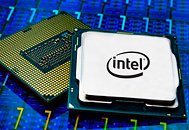Wednesday, September 25th 2019

Intel's 14nm Chip Shortage Continues
Intel is constantly having troubles with its silicon manufacturing business lately. Firstly the late delivery of 10 nm, then the shortage of 14 nm chips that started all the way back in 2018. Despite the making of $1 Billion investment into extending its 14 nm production capacity, there seems to be no end of troubles in sight.
According to sources close to DigiTimes, 14 nm production has fallen short of demand again and will likely cause many notebook manufacturers to delay their products to 2020. Most likely victim of this delay is the newly announced 10th generation mobile CPUs codenamed Comet Lake. Those CPUs were supposed to be built using Intel's "14nm++" revision of 14 nm technology which targets higher CPU frequencies and improved efficiency, but most likely due to continued shortage of 14nm, there will be only a few notebooks powered by these chips. As the source suggests, many manufacturers are likely to delay the launch of their products to 2020, when this situation is supposed to be resolved.
Source:
DigiTimes
According to sources close to DigiTimes, 14 nm production has fallen short of demand again and will likely cause many notebook manufacturers to delay their products to 2020. Most likely victim of this delay is the newly announced 10th generation mobile CPUs codenamed Comet Lake. Those CPUs were supposed to be built using Intel's "14nm++" revision of 14 nm technology which targets higher CPU frequencies and improved efficiency, but most likely due to continued shortage of 14nm, there will be only a few notebooks powered by these chips. As the source suggests, many manufacturers are likely to delay the launch of their products to 2020, when this situation is supposed to be resolved.

37 Comments on Intel's 14nm Chip Shortage Continues
From their investor's day back in May:
www.anandtech.com/show/14312/intel-process-technology-roadmap-refined-nodes-specialized-technologies
Officially, there is a single 14nm high performance process dubbed "P1272":
en.wikichip.org/wiki/intel/process
These "++" designations are marketing terms. They were created when it became apparent that the 10nm process "P1274" would was going to be delayed.
Same reason we don't see embedded SoCs or SoMs from AMD either - all of them went to UDOO, Smach, and khm-khm... Atari.
intel, AMD/TSMC is not geared for hardware hungry consumers it seems. I better put in a order on a Ryzen 9 3950X as soon they come up for order, else i can end up wait to next year for a new cpu.
R7-3750H - this directly competes with the i5-9300H and has a better IGP, but is only Zen+
R7-2800H - was supposed to take on i7-8750H, but only a Zen quad-core but better IGP than the above
R7-3700U - Zen+ that can properly compete with Intel's ultra portable CPUs
The only problem is that the drivers are really crap in the mobile space, even since the A10 laptops. I have an Ideapad Flex 14 with the 3700U and an older HP Pavilion with a A10-9620P. Great graphics performance for both, but shitty thermals (this is expected) and not-so-stable drivers.
And Is it really just consumer 14nm that's constrained.?
My system is quite stable (Previous bsods i had was for video playback, which plagued also desktop systems, and is now fixed).
PS
I can't believe FUD about drivers is still alive. Good job, shils.
Intel felt obliged to release FAYL